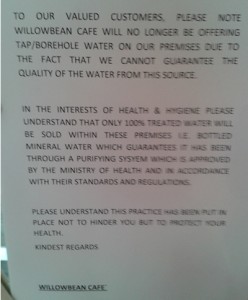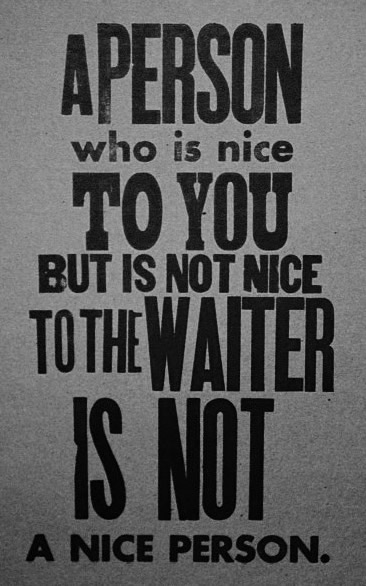 Having struggled to open my eyes this morning, I went to Willowbean Café for a highly recommended Red Ambulance: Beetroot, ginger, carrot and who knows what other vegetable juice guaranteed to help you stand up straight again.
Having struggled to open my eyes this morning, I went to Willowbean Café for a highly recommended Red Ambulance: Beetroot, ginger, carrot and who knows what other vegetable juice guaranteed to help you stand up straight again.
Whilst there, I overheard a customer asking why she was being refused a glass of water. She had ordered her breakfast and coffee, and preferred a glass of water to paying a dollar for a bottle of mineral water. Fair enough. The manager explained that they had been advised by the City of Harare that their water was contaminated, and that they should not serve it to customers.
Notices up in the café confirmed this, reading:
To our valued customers, please note Willowbean Café will no longer be offering tap / borehole water on our premises due to the fact that we cannot guarantee the quality of the water from this source.
In the interests of health and hygiene, please understand that only 100% treated water will be sold within these premises, i.e. bottled mineral water which guarantees it has been through a purifying system which is approved by the Ministry of Health and in accordance with their standards and regulations.
Please understand this practice has been put in place not to hinder you but to protect your health.
The manager also told the customer that they were on municipal water (not borehole). Whilst they’re lucky to even get municipal water in a city where so many are drilling boreholes or buying water deliveries, it doesn’t seem like much of the blessing if the very providers of the water are the ones telling you it’s not safe to drink.
Recent publications from Combined Harare Residents’ Association (CHRA) and Crisis in Zimbabwe Coalition are just some of those questioning the ability of the Local Government and Water ministries to deliver basic services such as clean drinking water.
All of this brought up some questions for me:
- Did the City of Harare also go to the nearby houses, gym, service station and primary and secondary school and advise them that their municipal water is unsafe to drink?
- If the city knows its municipal water is unsafe, what is it doing about it? If the water being supplied to Willowbean is unsafe, surely this means municipal water in other parts of the city is also unsafe?
- If you do run a café using an unsafe municipal water supply, what about the water you use to wash your vegetables, which you add to soup, and with which you make your coffee?
It also struck me as frustratingly unfair to the café. With unemployment being what it is in Zimbabwe, small local businesses need to be encouraged to grow and thrive, so that they can create jobs, support the families of their employees, and also create opportunities for local suppliers and merchants to provide their good and services. But if something as basic as providing clean, potable water in Zimbabwe’s capital is outside the reach of government, what hope is there to implement the broader objectives of “Indiginise, Develop, Empower, Employ?”



 Having struggled to open my eyes this morning, I went to Willowbean Café for a highly recommended Red Ambulance: Beetroot, ginger, carrot and who knows what other vegetable juice guaranteed to help you stand up straight again.
Having struggled to open my eyes this morning, I went to Willowbean Café for a highly recommended Red Ambulance: Beetroot, ginger, carrot and who knows what other vegetable juice guaranteed to help you stand up straight again.







